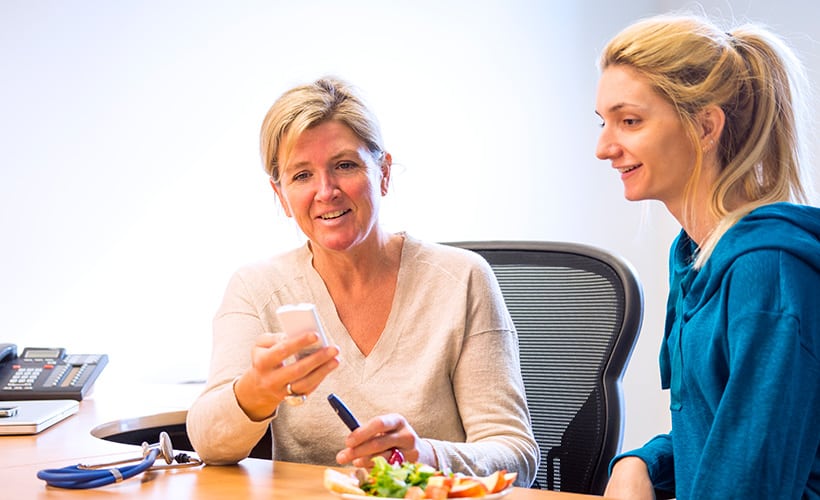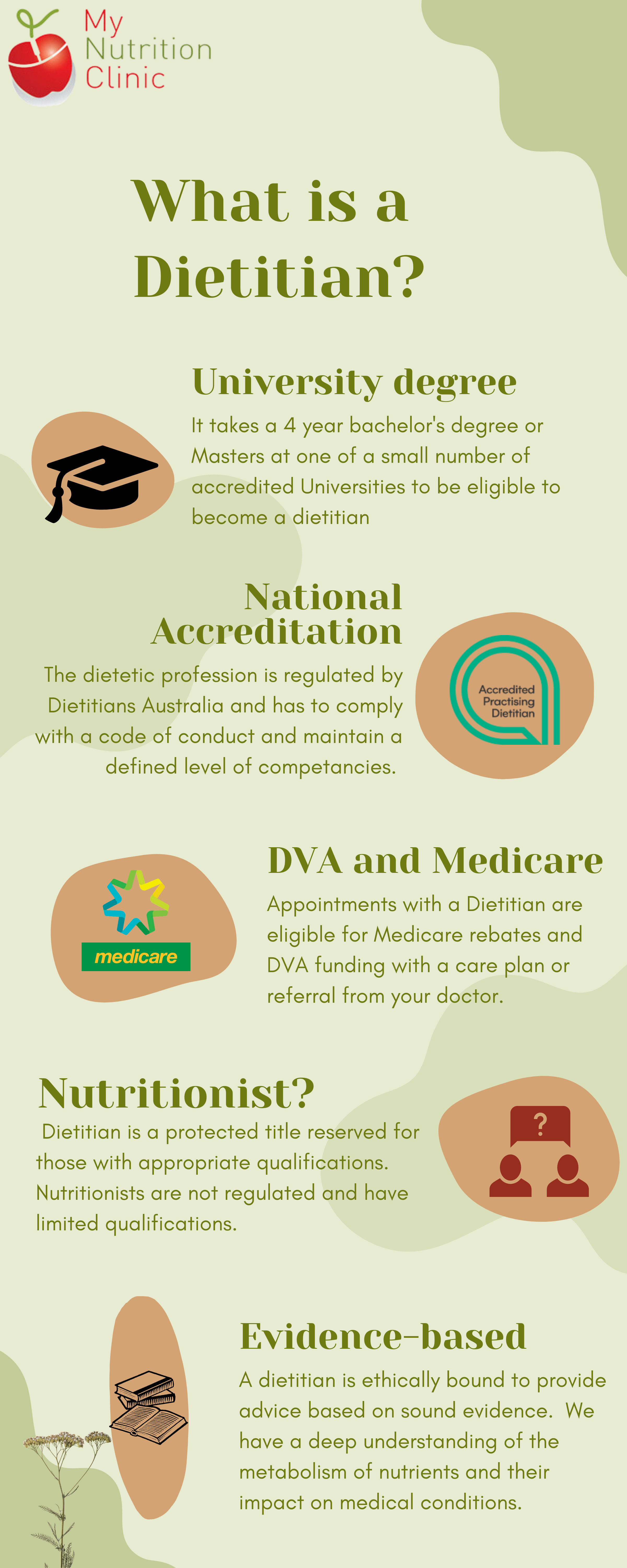All Categories
Featured
Table of Contents
-1
In the United States and several various other countries, a dietitian is a board-certified food and nutrition expert. They are very enlightened in the field of nourishment and dietetics the scientific research of food, nutrition, and their effect on human wellness. Through comprehensive training, dietitians acquire the competence to provide evidence-based medical nutrition treatment and dietary therapy customized to satisfy a person's needs.
-1To clarify, the qualifications of RD and RDN are interchangeable. However, RDN is an extra current designation. Dietitians can select which credential they prefer to make use of. To earn these credentials dietitians-to-be need to first make a bachelor's level or equivalent credit ratings from a recognized program at a college or college. Normally, this calls for an undergraduate science degree, including courses in biology, microbiology, natural and inorganic chemistry, biochemistry and biology, anatomy, and physiology, along with even more specialized nutrition coursework.
Senior Diet Optimization
-1This permits them to evaluate severe requirements, focusing on lethal conditions. Inpatient and outpatient dietitians also offer nutrition education and learning to individuals with specialized requirements, such as those recently out of surgery, in cancer cells therapy, or detected with chronic diseases like diabetes mellitus or kidney illness. In the outpatient setup, they give much more in-depth dietary counseling working in the direction of a nutrition-oriented objective.
-1Research study dietitians generally work in research study medical facilities, companies, or universities. As soon as dietitians have actually made their credentials and are working in the field, they can go on to specialize in a particular subcategory, such as pediatrics or sporting activities dietetics.
-1Others might work as wellness and nourishment specialists in media or as public speakers (Certified Clinical Nutritionist). Dietitians are qualified to handle nutrition therapy throughout a period of intense and persistent problems.
Functional Nutritionist
-1In numerous states, such as Alaska, Florida, Illinois, Maryland, Massachusetts, and Pennsylvania, RDs and CNSs are granted the very same state license, typically called an Accredited Dietitian Nutritional Expert (LDN) license. In states that don't regulate the use of this term, any person with an interest in diet or nutrition may call themselves a nutritional expert.
-1Since uncredentialed nutritional experts usually do not have the proficiency and training for clinical nourishment therapy and nutrition counseling, following their suggestions might be considered hazardous (). Before seeking advice from a nutritional expert, you may wish to examine whether your state regulates that may utilize this title. In the U.S. states that do not regulate the term, no levels or credentials are called for to be a nutritional expert.

-1
In states that do mandate licensure, the CNS or RD credential may called for. Those with CNS credentials are health and wellness professionals like registered nurses or doctors with advanced wellness levels that have looked for out extra coursework, finished monitored method hours, and passed an exam looked after by the Board for Accreditation of Nutrition Specialists.
-1While a few of these techniques might have robust scientific backing, others might not. Giving nourishment guidance without the appropriate understanding and training can be unsafe, specifically when counseling those with health and wellness conditions. If you are thinking about seeking advice from a nutritionist, you might want to ask if they are a CNS or have state licensure or accreditation, or another credential.
Holistic Dietitian
-1A number of states specifically regulate this term. In addition, nutritionists might pursue an advanced CNS certification.
-1It can be testing to aid people make genuine, long lasting changes in their lives. Both dietitians and nutritional experts provide a range of nutrition-based solutions to clients.
-1They have to have finished some degree of education in their area. They are likewise needed to have completed up to a year of supervised work, functioning within a guided program at a health care center, catering business, or area body. Dietitians have far higher assumptions positioned on their capabilities and degree of professionalism and reliability.
-1This means that there is no body that manages their qualifications and no specifically strict standards that nutritionists need to comply with in order to be able to practice. Dietitians, on the other hand, are signed up with across the country recognised bodies, such as the Dietitians Organization of Australia. They should follow the National Competency Criteria for Dietitians.
Dietitian For Ibs

-1
However, you can practice as a nutritionist without the exact same degree of accreditation as a dietitian. Nutritional expert courses can vary in length and quality, with some as short as 6 weeks and covering far less content than a dietetics training course. Depending on your education supplier, you can get a substantial quantity of knowledge with examining an easy nutrition training course; nonetheless it is necessary to investigate the training course material before beginning.
-1This can include participating in sector seminars or reading market publications. Nutritionists, on the various other hand, generally gain their certifications in order to supplement other certifications and provide much better advice to their clients. Nutritionists can acquire work in a wide variety of areas, consisting of public health suggestions, recommendations for people, and working with exclusive organisations.
-1Nutritionists can collaborate with showing off organisations, gyms, colleges and recommend media outlets on standard terms and right use of terms. Frequently, people will seek the services of a nutritional expert to assist them in getting right into shape. Dietitians can operate in a lot of the exact same functions as nutritional experts. With a greater level of accreditation, they can conveniently go into a duty that a nutritional expert would certainly hold, offered they are otherwise equal.
Weight Management
-1Dietitians often work with more clinically sensitive customers. Because of the high level of knowledge required to provide services to these individuals, only accredited dietitians are permitted to offer care.
-1In Australia there is a difference in between a dietitian and various other nutritional wellness suppliers including nutritionists. All dietitians are nutritional experts, yet nutritionists without a dietetics credentials can not call themselves a dietitian. While there are resemblances in between a dietitian and nutritionist there are differences in qualifications and regulation. The dietetic profession is controlled and fulfills strict requirements as laid out by the National Alliance of Self Regulating Wellness Professions (NASRHP).
-1Dietitians with the Accredited Practising Dietitian (APD) credential commit to ongoing training and education and learning throughout their careers. They follow our standard procedure. Dietitians have the understanding and skills found in the National Proficiency Standards for Dietitians. As a profession, nutritionists are not managed in Australia under NASRHP or licensed under a single regulative body.
Nutritionist Specialist
-1If you have a chronic health problem and a treatment strategy from your GP, you might be able to declare a Medicare refund when you see an APD. The main function of individuals working in the profession of dietetics is symbolized in this statement: The career of dietetics adds to the promo of health and wellness and the prevention and therapy of health problem by optimising the nourishment of populaces, neighborhoods and individuals. Herbal Nutritionist.
Table of Contents
Latest Posts
Ella – Kalamunda
Our Team – Bassendean 6054
Corporate Wellness
More
Latest Posts
Ella – Kalamunda
Our Team – Bassendean 6054
Corporate Wellness